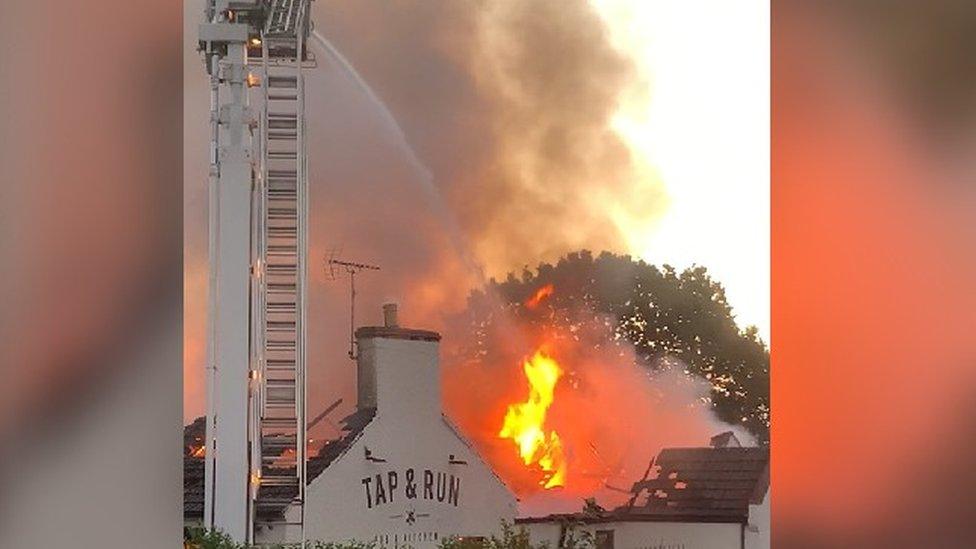Stuart Broad pub fire: How do you bring back a business?
- Published
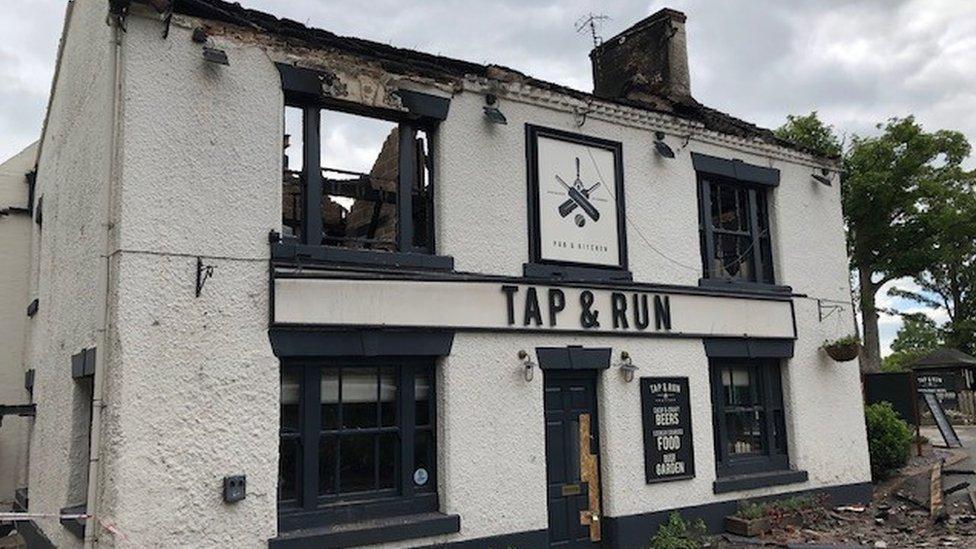
The pub had only reopened in 2018, following a refurbishment by its new owners
While cricketer Stuart Broad was helping England score a seismic victory against New Zealand, a few miles away his Nottinghamshire pub was standing charred and roofless, following a fire. BBC News asks village pub owners how they recovered from similar devastation.
The Tap and Run had been a fixture of village life for years.
Stuart Broad's pub was gutted in the fire

England bowler Stuart Broad co-owns the pub
Inside, diners and drinkers could see sepia-tinted photographs of village life a century earlier, which showed the pub - in Upper Broughton, on the border of Nottinghamshire and Leicestershire - at its heart.
But last Saturday the building was hit by a devastating fire, the cause of which was believed to be accidental.
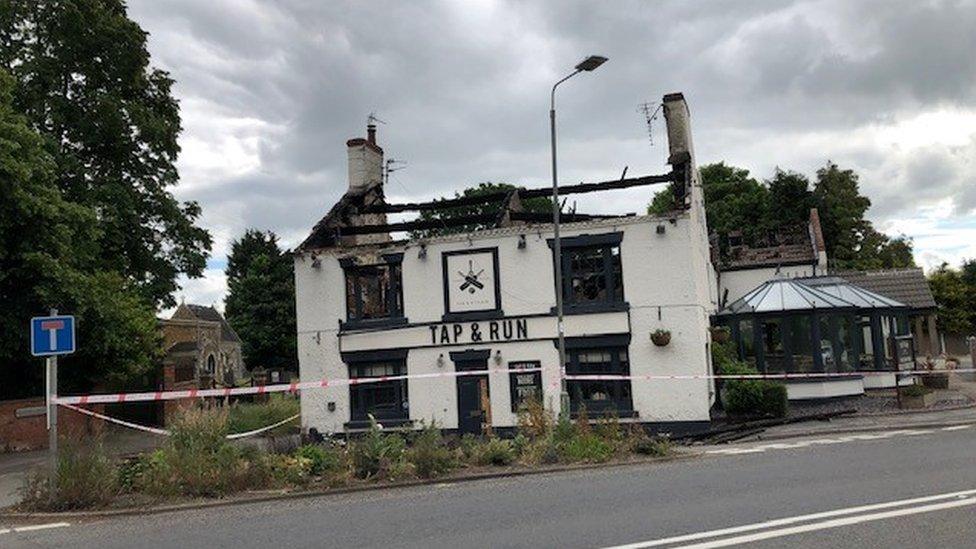
The Tap and Run had been a fixture of village life for years
The England and Nottinghamshire bowler, who co-owns the pub with former cricketer Harry Gurney, was staying positive, tweeting: "It hurts right now but we will come out the other side."
But, in a Facebook update, the owners have said: "Unfortunately the damage is quite substantial so it's going to be a long road ahead to get the Tap & Run back to its former glory.
"But rest assured we will do it and come back bigger and better than before."

The pub had featured in several national newspaper recommendations
The Tap and Run had only reopened in 2018, following a lengthy spell of closure and refurbishment but had achieved considerable success, with recommendations in national newspapers.
Its destruction speaks volumes, other owners say, about the challenges of caring for such beautiful, traditional buildings.

'I could smell this acrid smell'

Ben Jones says meals are currently being served from a temporary cabin, following a fire last year
"These old-style, country village pubs are maybe more at risk," said Ben Jones, owner of The Olive Branch, in Clipsham, Rutland, which also endured a blaze in December.
"If you are dealing with a traditional pub with wooden beams, open fires, maybe thatch and you add to that the reality of gas cookers and deep fat fryers, there is an element of risk."
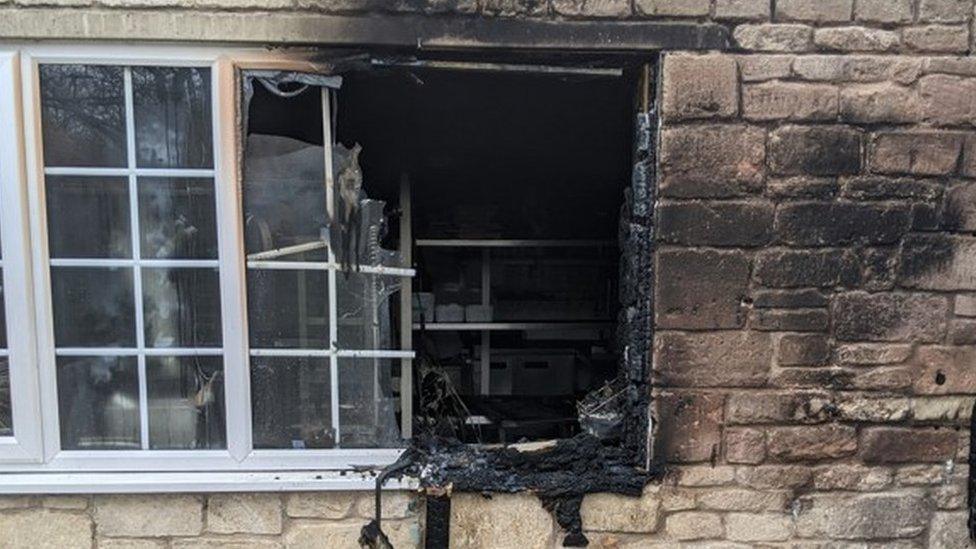
The pub, which features in the Michelin Guide, had a fire that spread to its kitchen
Meals at The Olive Branch - which features in the Michelin Guide - are currently being served from a temporary building in the car park after the fire, which was caused by a tumble dryer, knocked out the pub's kitchen.
"I received a phone call at 05:00 GMT to say the alarms were going off. I live about 20 minutes away, so I drove in, absolutely scared to bits at what I was going to see," Mr Jones said.
"When I opened the door, I could smell this acrid smell. I walked into the kitchen to discover flames in one of the corners."
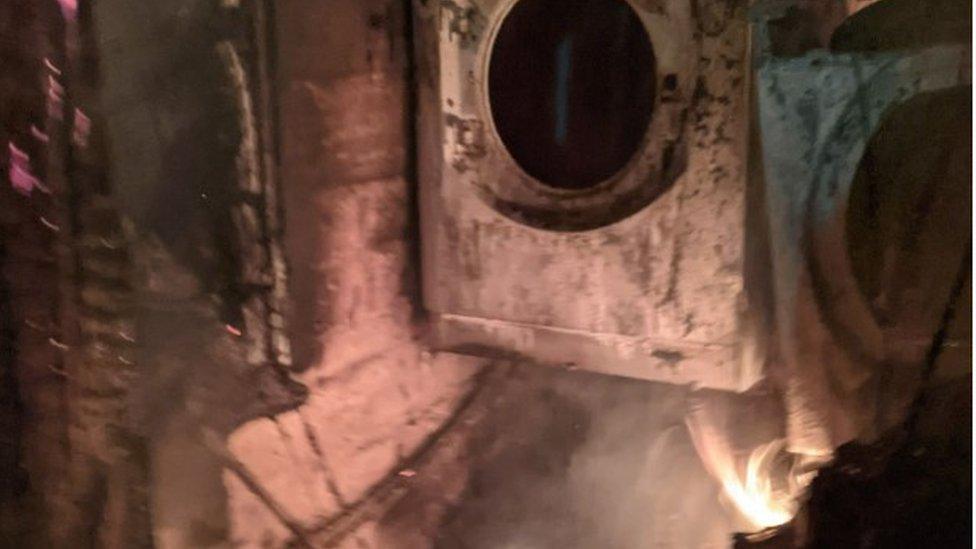
The blaze started in the laundry
The fire brigade took around an hour to extinguish the blaze but Mr Jones found the smoke had damaged all of the electric equipment in the kitchen.
"Every piece was condemned," he said. "Thankfully, nothing had spread into the pub so we were able to carry on trading and serving drinks.
"The following day we ordered a temporary kitchen and we were able to serve 70 guests on Boxing Day, which was quite an achievement.
"We had to keep things going. We didn't want to close. Although the insurance would have covered some of the loss of revenue, we wouldn't have been able to keep our staff or serve the customers who had booked in for Christmas."
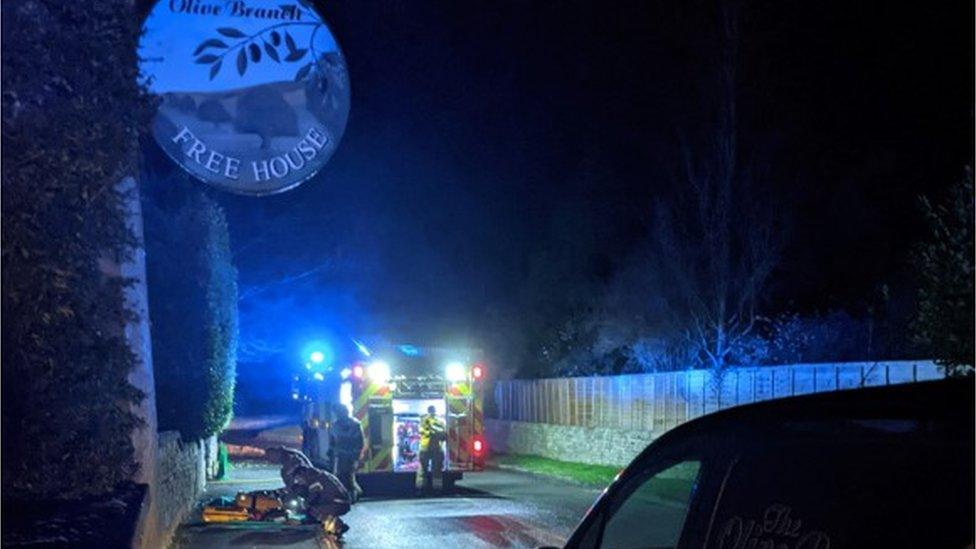
The fire took around an hour to extinguish but smoke damaged the kitchen's electrical equipment
The pub is hoping work will start on its new kitchen next week.
At present, they are carrying food across the car park using heated cloches to keep it warm and, during colder spells, fleeces to keep the staff warm.

Mr Jones says his business has proved resilient to the challenges of Covid and the fire
"Value-wise, the damage has been in excess of £100,000," said Mr Jones. "And then there have been the building repairs and the loss of revenue. The insurance company has been very understanding.
"We have also had amazing help from local carpenters and electricians.
"Although it has been stressful, I think we were more resilient as a business because we had come through Covid and adapted. We have taken the opportunity to make things better but there have definitely been highs and lows."

'It was heart-wrenching'
The Adnams-owned pub overlooks the River Orwell estuary between Ipswich and Felixstowe
When a spark from the chimney hit the thatched roof of Grade II listed The Ship in Levington, near Ipswich, it proved devastating for the fixtures and fittings of the 13th Century pub.
"There were staff sitting on the grass, watching the pub burn down and helpless to do anything," said Tracey Smith, property manager for owners Adnams.
"It was heart-wrenching.
"The pub stood at the heart of the village and there was a real sense of loss."
Fortunately, there were no injuries sustained in the fire that took place on a March morning in 2019.
"Sometimes, a thatch fire can smoulder for some time but this was noticed almost straight away," Ms Smith said.
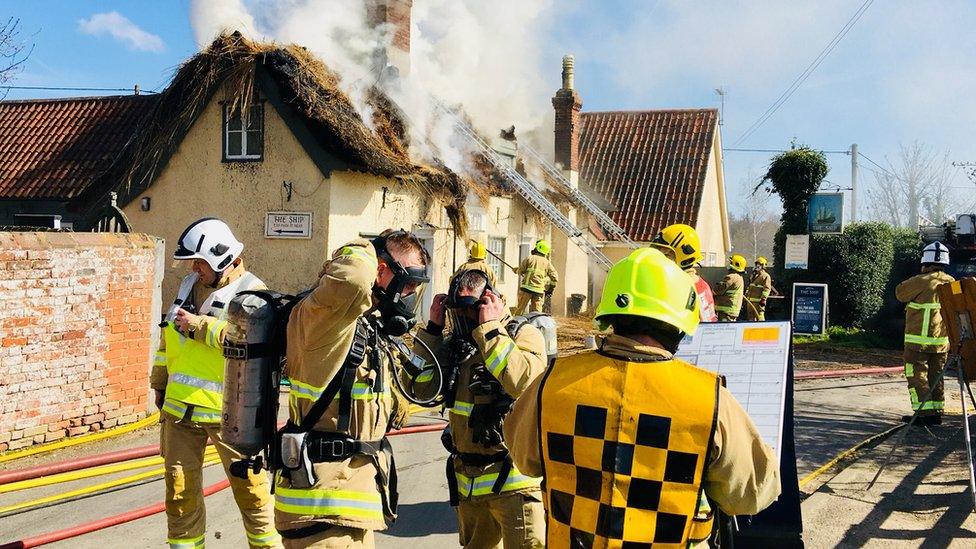
The pub was closed for eight months to allow restoration to take place
The pub was closed for about eight months to allow restoration to take place.
"The thatch was gone so the roof had to be rebuilt," said Ms Smith.
"Luckily the kitchen wasn't damaged but the bar area all needed to be refurbished. We retained as much as we could of the original fabric but unfortunately a lot of that was lost."
The business worked closely with conservation officers to ensure the interiors were restored sympathetically.
"While it was devastating for Adnams and the community, once we got to the stage of reopening there was a real buzz," Ms Smith said.
The business has made efforts to protect its pubs from future fires, by lining the roof with fire retardant materials and installing a fire suppression system above the deep fat fryer.
"With listed buildings, there is only so much you can do without damaging the fabric of the place but we have tried to take away some learnings.
"Once you get through the misery, there is a real feelgood factor once more," she added.
A spokesperson for Historic England said commercial historic buildings could be at higher risk of incidents of fire than domestic and modern buildings.
"However, all historic buildings can be protected from the ravages of fire, provided experienced advice is sought to ensure a sympathetic and robust fire strategy," they said.
"Historic England offers advice for all building services issues for historic buildings including fire prevention."

Follow BBC East Midlands on Facebook, external, Twitter, external, or Instagram, external. Send your story ideas to eastmidsnews@bbc.co.uk, external.
Related topics
- Published11 June 2022
